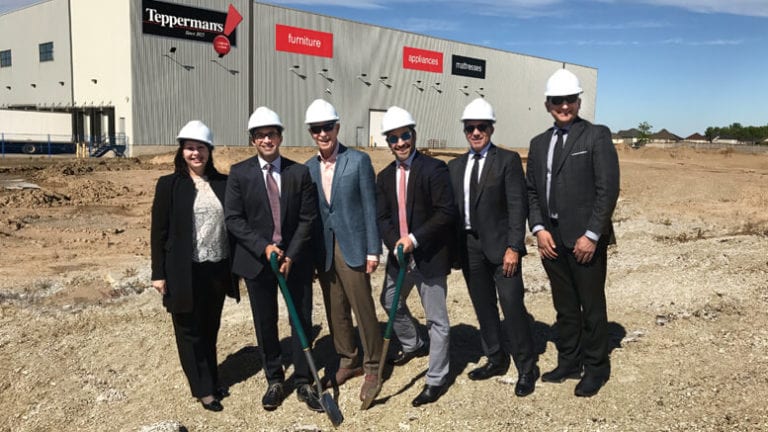Shift Tech Summit message—ignore technology at your own peril.
At a recent retail technology conference for furniture retailers and suppliers, innovation expert Jeremy Gutsche told the story about the game-changing company that helped reinvent the communications industry. Innovation was in the company’s blood: It had invented the spell checker, grammar checker, and laptop word processor. In 1989, Smith Corona—that’s right, the typewriter company—hauled in $500 million in revenue and was still growing. The next year the company dabbled in computing in a joint venture with Acer.

But by 1991 that dance was over. Smith Corona pulled out thinking it could stand on its own two feet—and legacy. Three years later Smith Corona declared bankruptcy, and Gutsche says, a lesson was born. “A legacy is nice to have if you’re in business, but a legacy isn’t enough anymore,” said Gutche. “If you’re in the furniture business—or any business for that matter—you have to be evolving, adapting, changing with the times. If not, you’ll find you won’t even have your legacy to fall back on.”
Adapt or perish. That was the recurring mantra from last month’s Shift Tech Summit, a three-day conference that, at times, toggled between a learning session and wake-up call.
The event, sponsored by Amber Engine and Reverie, brought together a dozen of some of the nation’s most innovative business men and women—nearly all of them outside the furniture industry—to inspire retailers to start thinking outside the box or find themselves in one. As in, six feet under.
Dan Gilbert, CEO of Quicken Loans and the owner of the Cleveland Cavaliers, kicked off the conference by imploring retailers to fail. “Almost every person or company I know that has sustained success these days is an innovator,” said Gilbert. “And by nature, a person or company that is an innovator is also open to failing.”
Gilbert said small- and medium-sized brick-and-mortar retailers have long resisted adopting technology to their business because, he theorized, of the fear of failing when something inevitably went wrong. “You need to know that if you don’t have a tolerance for failing once in a while, you have zero innovation going on in your business, and sooner or later there will be a bankruptcy because you cannot survive and change in today’s world without innovation.”
Gutsche, who researched hundreds of successful innovators and risk-takers for his book Better and Faster, The Proven Path to Unstoppable Ideas, likened many of today’s retailers to farmers.
“Think about the past 100, 200, 2000 years,” he said. “Someone planted a seed and a few months later he or she saw the benefit of that work. The next season they did the same thing with the same result. Who would want to mess with that kind of success?”
Gutsche made the argument that your store is your farm. “Over time we become wired to repeat whatever it is that led to the previous year’s harvest. We get into the way of thinking, ‘it worked, let’s not mess with what was successful.’”
But, said, Gutsche, here’s the rub: “On one hand it’s important to harvest, to do what you’re good at and nobody knows better than you what you’re good at. But think about this: If you’re doing the same thing over and over, what might you be missing out on?”
The road to success is littered with companies that failed to adopt. Gutsche pointed out Kodak, Blackberry and the aforementioned Smith Corona. “If there’s a common thread among them,” said Gutsche, “it’s that these companies and a lot of others at one time or another were industry leaders, but where are they now? Eventually they all resorted to behaving like a farmer, protecting their territory by doing what they knew they could do and not venturing out and trying something new, a technology perhaps. Instead they retreated back to repeat what they had done before, abandoning innovation they created. That thought process eventually destroyed them.”
Gutsche said there’s a better way. Retailers need to shed their farming label for that of a hunter. Hunters are open to trying something new, to embracing a new technology or marketing strategy. “Hunters are the opposite of farmers,” he said. “Farmers are complacent while hunters are insatiable. Eat or be eaten—that’s the hunter.”
Gilbert knows all too well about failure. After his Cavaliers lost to the Golden State Warriors in the 2015 NBA Championship, the team adjusted its roster and came back to beat the Warriors last year for the title.
Gilbert said retailers feel as if they’re late to the game in terms of adopting technology. “The truth we’re all in our own bubbles and nobody knows where their competition is,” he said. “The good news about technology is that, very quickly, (retailers) can get caught up.”
Kira Wampler, CEO of art.com and one of Shift Tech Summit’s speakers, said retailers have learned to fear failing over the years when just the opposite should be true. She implored retailers to champion technology and innovation in their stores even while some of those projects might fail miserably.
“I think about my own kids and when they start to learn how to walk and they fall, what do they do?” Wampler asked. “They look at you and you’re smiling, so they get up and get going. That’s how I want you to operate your store. Encourage your people to try something different and, if they fall, encourage them to get up and try again.”
Wampler offered a step-by-step plan to retailers wanting to implement a new piece of technology in their stores.
- Educate the key stakeholders. That sounds like a given, but so often, said Wampler, the ones in charge of adopting a new technology or system, are left to succeed or fail on their own.
- Connect the new with the trusted. Marry a new technology with something that is already working well for you.
- Use real metrics. You can’t measure feelings. “Concrete metrics will give you concrete results, which is what you want,” said Wampler.
- Celebrate successes and failures. You will fail a lot and your team will feel bad. “Here’s the good news: We learn from our failures,” said Wampler. “That’s a good thing. Celebrate getting smarter!”

The Shift Tech Summit also offered retailers a peek at technology that can help them grow their business or simplify their daily workload. From Pinterest to online design firms, no topic was left uncovered. One of the most popular forums was the panel discussion on augmented and virtual reality.
Piotr Baczynski, the CEO of Immersion VR, said the technology was about to take off—sooner rather than later if his prediction that Apple will release a virtual reality headset of its own in the next two years proves true. “There’s been a lot of talk about VR and it’s only going to grow,” he said. “The next 24 months will bring greater understanding of AR and VR, with advances in the medical and educational fields.”
Sam Sesti, president of ONU, a software company that builds 3D visuals for retailers’ ecommerce business, said that when working with VR and AR, companies should focus on customers and their needs.
Beck Besecker, the CEO of software maker Marxent, said speed will trump quality in the field, and pointed to the children’s video game Minecraft.
“It’s really about passing the controller to the customer and letting them play,” he said of the role of VR in sales.
Unlike other industries, the furniture industry stands apart because its sales model is largely based on shoppers walking into a store to browse, touch fabric and sit down on the product before deciding, Besecker said.
But as consumers continue to turn their buying habits toward the web, VR and AR will take on added significance. He said if a customer buys a sofa or chair online in VR, they’re five times less likely to return it. “If you’re in the furniture industry, that’s a stat that’s pretty significant to track,” Besecker said.











